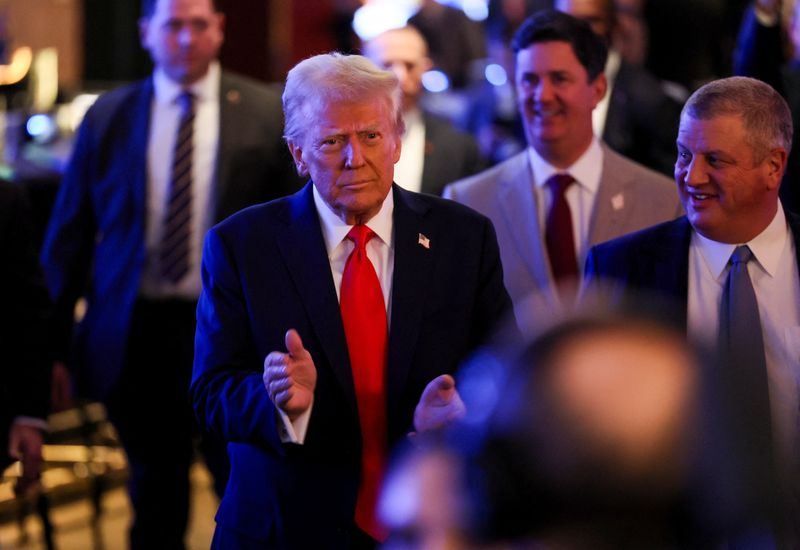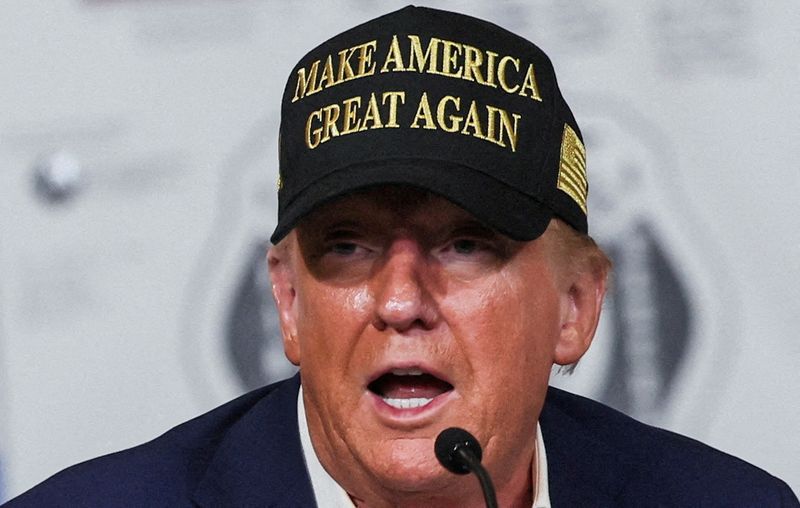By Gram Slattery
WASHINGTON (Reuters) - Donald Trump has been in office for five days, and yet he has already imposed his will on Washington with ruthless speed and efficiency, showing that even his most radical campaign promises were far from just bluster.
The Republican president has taken the first steps toward fulfilling his vow of remaking a federal bureaucracy he believes was hostile to him during his 2017-2021 presidency, reassigning or firing hundreds of civil servants in simultaneous moves against a swath of agencies.
He has rushed the military to the southern border, fired the head of the U.S. Coast Guard and challenged decades of constitutional law with a series of wide-ranging executive orders - 26 of them issued within hours of taking office - that cover everything from environmental regulations to America's citizenship rules.
In perhaps the most audacious move of all, he pardoned about 1,500 supporters who took part in the Jan. 6, 2021, attack on the U.S. Capitol, the global symbol of American democracy.
Trump's allies have compared his shock-and-awe opening foray to a special forces raid that has caught federal workers, unions, advocacy groups and even the media off-guard in its scope.
They credit the meticulous, years-long work of conservative allies who have spent much of Trump's time out of office drafting detailed policy plans that would allow him to hit the ground running.
"This is the beachhead team taking over the federal government," Steve Bannon, who served as the White House chief strategist during Trump's first term and is close to many of Trump's core policy advisers, told Reuters.
Trump's opponents say he is distorting the U.S. Constitution and expanding the limits of executive power beyond its intended limit. They also say Trump's opening moves show he is less interested in uniting the country than on radically transforming it - and in many cases exacting vengeance.
In one of his opening moves, Trump removed the security clearances of dozens of former intelligence officials who attributed unflattering media reports about former President Joe Biden's son Hunter to a Russian influence operation.
Trump also stripped three former national security officials of their security details, even in the face of credible threats from Iran. His aides found time to remove the portrait of one of his harshest critics, General Mark Milley, former chairman of the Joint Chiefs of Staff, from a Pentagon hallway.
He purged the White House National Security Council of career officials who were seen by Trump's team as insufficiently loyal to the president. The move allows him to import loyalists into over 100 national security roles.
"He is clearly not a man who discards his grudges easily," said William Galston, a senior fellow at the Brookings Institution who has worked in and out of government for over 40 years.
The White House did not respond to a request for comment on this story.
YEARS IN THE MAKING
Even Trump's foes say the last five days represent a stunning contrast to his first term, when infighting and poor preparation scuttled many of his most ambitious policy initiatives.
"In terms of just the scope of all this and the speed, his team has shown the results of extraordinary preparation," said Timothy Naftali, a presidential historian and former director of the Nixon presidential library.
Many of Trump's policies dovetail with those advocated by "Project 2025," a consortium of conservative organizations that has spent more than two years drafting policies in anticipation of Trump's possible return.
Trump distanced himself from the project last year, saying he knew nothing about it, even though many former aides were deeply involved. But its influence on his new White House operation is all too clear.
Project 2025 advocated for the purge of career officials at the National Security Council.
Another policy pushed by the project that Trump has already adopted is making potentially hundreds of thousands of civil servants easier to fire by creating a new category of federal worker known as "Schedule F."
Trump has also floated an overhaul of the Federal Emergency Management Agency that would devolve many of FEMA's functions to the states, another Project 2025 proposal.
"There's been hardcore policy and political people that have believed in Trump ... and started working immediately in 2021 for Trump's return to the White House," Bannon said. "And that's what you're seeing come to fruition."
HEIGHT OF POWER?
Trump's agenda faces roadblocks going forward. The opening weeks of his administration may represent the height of Trump's power, some supporters acknowledge.
Many of Trump's executive orders test the limits of constitutional law. An order to end birthright citizenship - a constitutional doctrine holding that almost everyone born in the United States is automatically a citizen - has already been enjoined by a federal court.
Several other pledges and orders have immediately faced lawsuits from states and advocacy organizations, and the shock and awe of his first week could get mired in litigation that lasts for much of his term.
Trump may face a challenge maintaining the Republicans' narrow congressional majority in the House of Representatives in two years. The party of the incumbent president often loses seats in midterms. If that happens, it would result in the already narrow legislative path closing for Trump altogether.

"Trump has a decisive mandate from the American voters to bring dramatic reforms to Washington," said Mike Davis, a close Trump adviser on judicial matters.
"That political mandate will fade if he doesn't deliver - and deliver fast."
